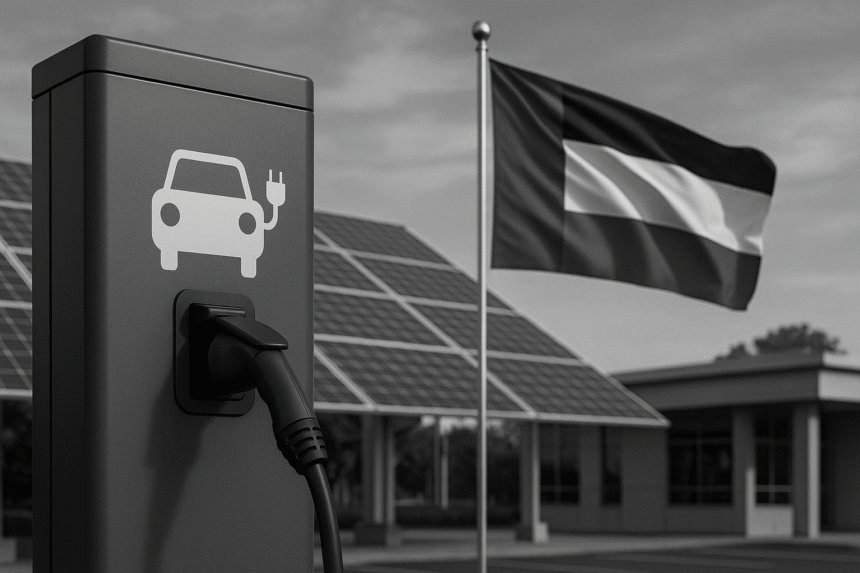What Is the EV Green Charger Initiative and How Does It Affect Public Projects?
The EV Green Charger Initiative is one of Dubai’s most impactful government-led programs to drive electric vehicle adoption. Led by the Dubai Electricity and Water Authority (DEWA), this initiative plays a key role in shaping how electric vehicle infrastructure evolves across public and government projects. For any executive exploring investments or partnerships in the EV sector, understanding the EV Green Charger Initiative is crucial.
What Is the EV Green Charger Initiative?
The EV Green Charger Initiative was launched by DEWA to support the UAE’s broader sustainability goals. Specifically, it aims to:
- Promote the adoption of electric vehicles (EVs) in the Emirate of Dubai
- Develop an integrated network of charging stations across the city
- Reduce carbon emissions from the transportation sector
DEWA installs and operates EV charging stations under this program and offers various incentives for individuals, businesses, and public entities that adopt electric mobility.
Regulatory Impact: What Has Changed?
If you’re a public-sector project leader or infrastructure provider, the EV Green Charger Initiative has likely already changed your operating landscape. Here’s how:
- Licensing & Approvals: All EV charging stations must now meet DEWA standards and integrate into the Green Charger network.
- Connectivity Requirements: Chargers installed under the initiative are linked to DEWA’s centralized smart grid platform.
- Reporting Obligations: Project operators need to coordinate with DEWA for station data tracking and maintenance schedules.
For new government projects, especially those under the Roads and Transport Authority (RTA) or Dubai Municipality, compliance with DEWA’s Green Charger specs is a non-negotiable.
Who Qualifies for the Initiative?
The EV Green Charger Initiative supports both public and private entities. Qualifying participants include:
- Government authorities running infrastructure projects
- Real estate developers incorporating EV chargers into residential or commercial units
- Fleet operators shifting to electric vehicles
- Hospitality and retail venues that serve the public and need smart charging access
If your organization operates in any of these sectors and plans to install EV chargers, you must align with Green Charger protocols to obtain necessary permissions and grid integration.
Procurement & Technical Standards
Whether you’re planning a municipal car park, a new smart building, or a government fleet depot, EV infrastructure under the initiative must comply with:
- Type 2 connector systems (widely used in Europe and UAE)
- DEWA-certified suppliers and hardware
- Smart metering capabilities
- Integration with DEWA’s mobile app for public usage data and billing
Project bidders are often evaluated based on their charger supplier’s compliance, response time, and warranty terms. It’s not just about hardware anymore; data integration and maintenance uptime are critical.
Long-Term Infrastructure Implications
The EV Green Charger Initiative is more than a policy—it’s a roadmap for electrifying urban infrastructure. Here’s what it means long-term:
- Standardized Charging Infrastructure: Reduces fragmentation and ensures smoother EV adoption across the Emirate.
- Increased Public Access: Strategic placement of chargers in high-traffic government facilities, metro stations, and malls.
- Sustainability Alignment: Supports UAE Vision 2030 goals and complements Dubai’s Clean Energy Strategy.
- Tech-Ready Cities: Integrates with broader smart city initiatives, such as AI-powered traffic systems and green buildings.
Key Considerations for Public Project Stakeholders
If you’re involved in planning, bidding for, or executing public infrastructure projects, here’s your action list:
- Vet Your EV Charger Supplier: Ensure they are approved under DEWA’s Green Charger program.
- Factor in Smart Features: Choose chargers that integrate seamlessly with DEWA apps and data systems.
- Consult Early: Engage DEWA during the design phase to avoid retrofitting or delays.
- Plan for Scalability: Infrastructure needs may expand quickly—build in flexibility.
- Align with Tender Criteria: DEWA and municipality tenders now reflect Green Charger standards.
These steps will ensure your public project is not only compliant but future-proof.
Conclusion: Strategic Alignment with the EV Green Charger Initiative
The EV Green Charger Initiative is more than a utility program—it’s a strategic enabler for green growth. As Dubai positions itself as a regional leader in sustainability and smart mobility, aligning with this initiative is not optional—it’s essential.
Whether you’re in real estate, fleet management, or infrastructure development, early alignment with DEWA’s Green Charger goals can open doors to government tenders, public-private partnerships, and long-term impact.



Leave a Reply